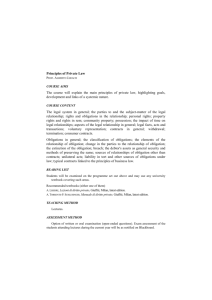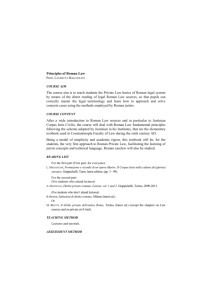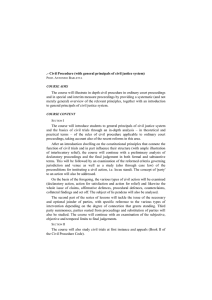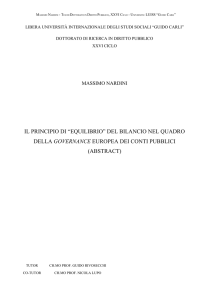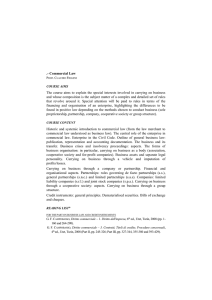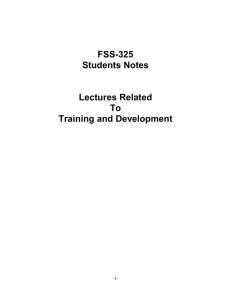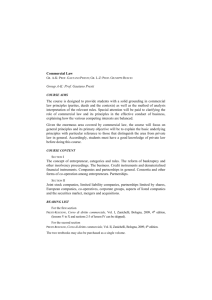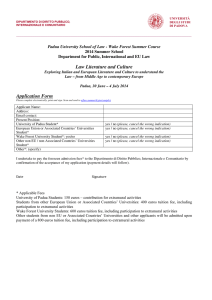Principles Law
advertisement
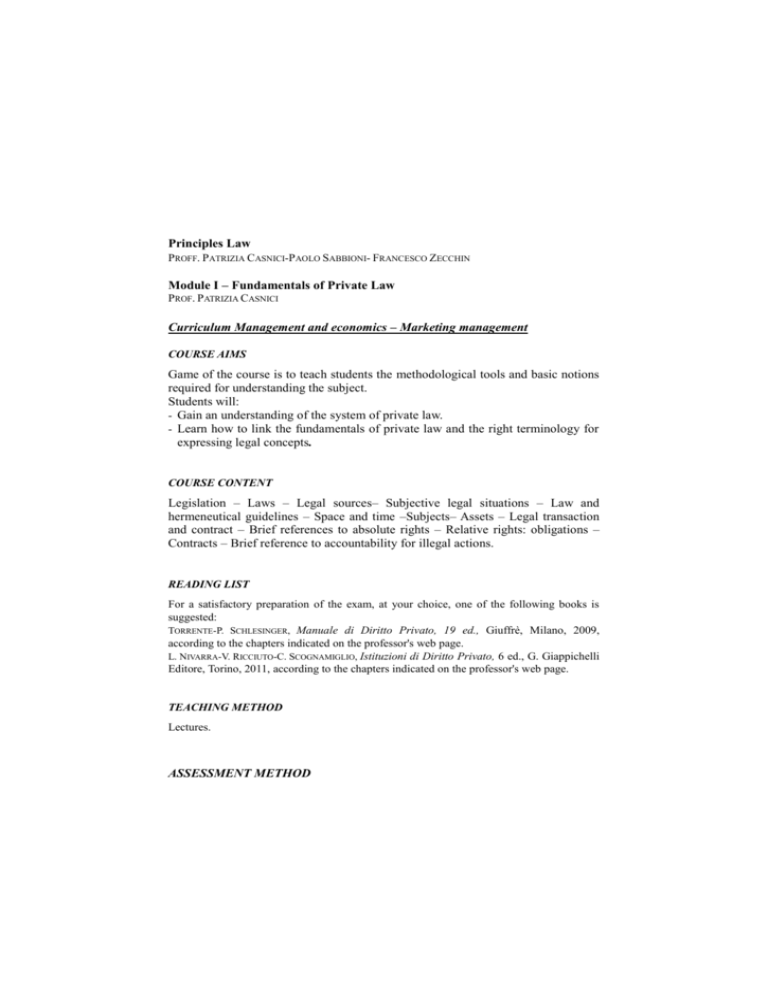
Principles Law PROFF. PATRIZIA CASNICI-PAOLO SABBIONI- FRANCESCO ZECCHIN Module I – Fundamentals of Private Law PROF. PATRIZIA CASNICI Curriculum Management and economics – Marketing management COURSE AIMS Game of the course is to teach students the methodological tools and basic notions required for understanding the subject. Students will: - Gain an understanding of the system of private law. - Learn how to link the fundamentals of private law and the right terminology for expressing legal concepts. COURSE CONTENT Legislation – Laws – Legal sources– Subjective legal situations – Law and hermeneutical guidelines – Space and time –Subjects– Assets – Legal transaction and contract – Brief references to absolute rights – Relative rights: obligations – Contracts – Brief reference to accountability for illegal actions. READING LIST For a satisfactory preparation of the exam, at your choice, one of the following books is suggested: TORRENTE-P. SCHLESINGER, Manuale di Diritto Privato, 19 ed., Giuffrè, Milano, 2009, according to the chapters indicated on the professor's web page. L. NIVARRA-V. RICCIUTO-C. SCOGNAMIGLIO, Istituzioni di Diritto Privato, 6 ed., G. Giappichelli Editore, Torino, 2011, according to the chapters indicated on the professor's web page. TEACHING METHOD Lectures. ASSESSMENT METHOD The exam consists of a written test lasting 90 minute (10 open-ended questions). For each response will attribute a score from 0 to 3. The aim of examination is to assess the level of knowledge and understanding of the candidate. In exceptional cases, students can take the exam orally. NOTES It’s recommended the attendance in the course and, anyway, the knowledge of the Italian Codice civile and the related rules in its last edition. Module I - Principles of Private Law PROF. FRANCESCO ZECCHIN Curriculum International Management COURSE AIMS Teaching to students the methodological tools and basic notions required for understanding the subject. LEARNING OUTCOMES Student will be introduced to understanding the private law system and learning how to link the fundamentals categories of private law, particularly in obligations and contract. COURSE CONTENT - Legal Order - Law Sources - Individual Legal Rights - Parties - Brief references to Property - Obligations - Contract - Contracts of Management - Brief references to Tort Law. READING LIST TORRENTE -P. SCHLESINGER, Manuale di diritto privato, Giuffrè Editore, last edition. The chapters to be studied will be listed at the beginning of the course and on the Professor’s web page. TEACHING METHOD Classroom. ASSESSMENT METHOD The exam consists of a written test lasting 90 minute (10 open-ended questions). For each response will attribute a score from 0 to 3. The aim of examination is to assess the level of knowledge and understanding of the candidate. In exceptional cases, students can take the exam orally. NOTES It’s recommended the attendance in the course and, anyway, the knowledge of the Italian Codice civile and the related rules in its last edition. Module II – Principles of Public Law PROF. PAOLO SABBIONI COURSE AIMS The aim of the course is to provide students with the basic overall framework and institutional notions governing public law, mainly focusing on the most important principles for economic students. Students will: - gain an understanding of the public law system. - learn how to link the basic groundings of public law and the right terminology for expressing legal concepts. COURSE CONTENT I. State, Constitution and European Union. I.1 Law and public law. I.2. Constitutions and the Italian Constitution. I.3 The European Union. Domestic sources and EC sources. II. State, Regions and independent local authorities. II.1 Forms of State. II.2 The Constitution and its Statues. II.3 Legislature. II.4 Public Administration. II.5 Financial relations. III. Relations between authorities. III.1 Forms of government. III.2 Parliament and Councils. III.3 Executives. III.4 The President of the Republic. III.5 Public administration: structure, principles and administration operations. IV. Freedom and guarantees. IV.1 Liberties. IV.2 Judiciary and special judges. IV.3 Constitutional Court. READING LIST For students attending lectures P. SABBIONI, Lezioni di diritto pubblico, EDUCATT, supplemented by material available from the lecturer’s webpage. For students unable to attend lectures, one of the following text books, focusing on the parts referred to on the lecturer’s website: P. CARETTI-U. DE SIERVO, Istituzioni di diritto pubblico, Giappichelli, Turin. A. BARBERA-C. FUSARO, Corso di diritto pubblico, Il Mulino, Bologna. TEACHING METHOD The course will be taught in lectures focusing on specific topics. Supplementary material referred to at lectures will be uploaded on the lecturer’s webpage. ASSESSMENT METHOD The written test consists of four open-ended questions and gives a maximum score of 31/30. The examination is intended to assess knowledge and logical skills of the student . NOTES Information on office hours available on http://docenti.unicatt.it/. the teacher's personal page at
